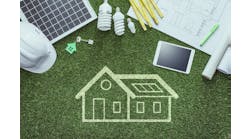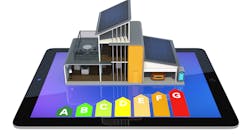It seems as if I just began to learn about the Internet of Things and suddenly it’s here and everything is connected.
I recently attended the Mechanical Contractors Association of American Construction Technology Conference in Oak Brook, Illinois, and the tech that’s out there is mind-boggling. Countering the traditional image of a construction worker, MCAA President Steve Dawson, Harrell-Fish Inc., Bloomington, Indiana, said, “You have to be a rocket scientist these days to be in construction.”
The conference was kicked off by Paul Doherty, CEO of The Digit Group, a self-described “recovering architect,” who talked about how the Internet of Things is changing building design and, consequently, the design of cities.
Mechanical contractors are playing a leading role in the Internet of Things, he said, because “the trades create the most accurate and authentic data in the industry.”
Doherty explained that we’ve moved to Internet 2.0 and BIM 2.0 that will result in smart cities, not just smart buildings. Equipment inside buildings will identify themselves by RFID beacons. Facilities owners and managers can get customized “dashboards” that show them the building operating data that’s most useful to them. Sensor information will allow building energy use to be optimized floor by floor if there’s, for example, 80 people occupying one floor but only 20 on another.
Currently building owners have to deal with multiple control networks for mechanical systems, security, lighting and elevators, Jeff McClain, LEED AP, regional operations director for Schneider Electric, told the MCAA contractors. The systems have limited integration abilities, limited analytics, proprietary programming languages and legacy user interfaces. They are complicated to run and to service and expensive for the owner.
Contractors have an opportunity to sell integrated building management systems that are smarter, McClain said. For example, why not control HVAC in a conference room by “seeing” the number of occupants rather than controlling it by a timer?
At this year’s meeting of the Plumbing Industry Leadership Coalition that met in D.C. in mid-May, Dr. Sokwoo Rhee, the National Institute of Standards & Technology’s associate director of cyber-physical systems programs, told attendees that IoT is analogous to putting building automation systems into commercial buildings 20 years ago. The BAS has sensors and controllers all over the building communicating with each other. The difference now is that the sensors are everywhere.
“You get big data from sensors and other sources and crunch it,” Dr. Rhee said. “That’s where the sensors are playing a role, and what’s important is how do you extract information out of all this data?”
The purpose is to come up with some kind of service, Dr. Rhee said. You extract data, perform data analytics, and use that information to create a service that you couldn’t do before.
On the residential side, the key question is how can contractors own this market, especially the service aspect? This is untapped market without an identifiable single-source provider. We do not, however, want that provider to become the cable guy.
Manufacturers have to develop equipment that will work with an open communications protocol. Top-tier contractors will need to develop additional skillsets in home security, door locks or garage door openers, all easy things to do for contractors accustomed to dealing with more complicated systems. This should be a no-brainer for contractors who are already involved in the home performance market.
I’ve heard some contractors talk about the residential IoT market and they’ve tended to get too caught up in widgets. Contractors need to remember, however, that homeowners are not buying boilers, water heaters and door locks — they’re buying the peace of mind that comes from controlling their home. If they go on vacation, they can shut off the water to the house, lower the temperature on a heat pump water heater, setback the thermostat, and make sure the doors are locked, all from an app. Peace of mind, not products.
This will happen, both because homeowners and building owners will want it and because EPA and DOE may mandate it down the road. Electric utilities will love this because it fits in with their smart grid strategy, so they may provide incentives.
It’s all about useful services that your customers will want to buy.


